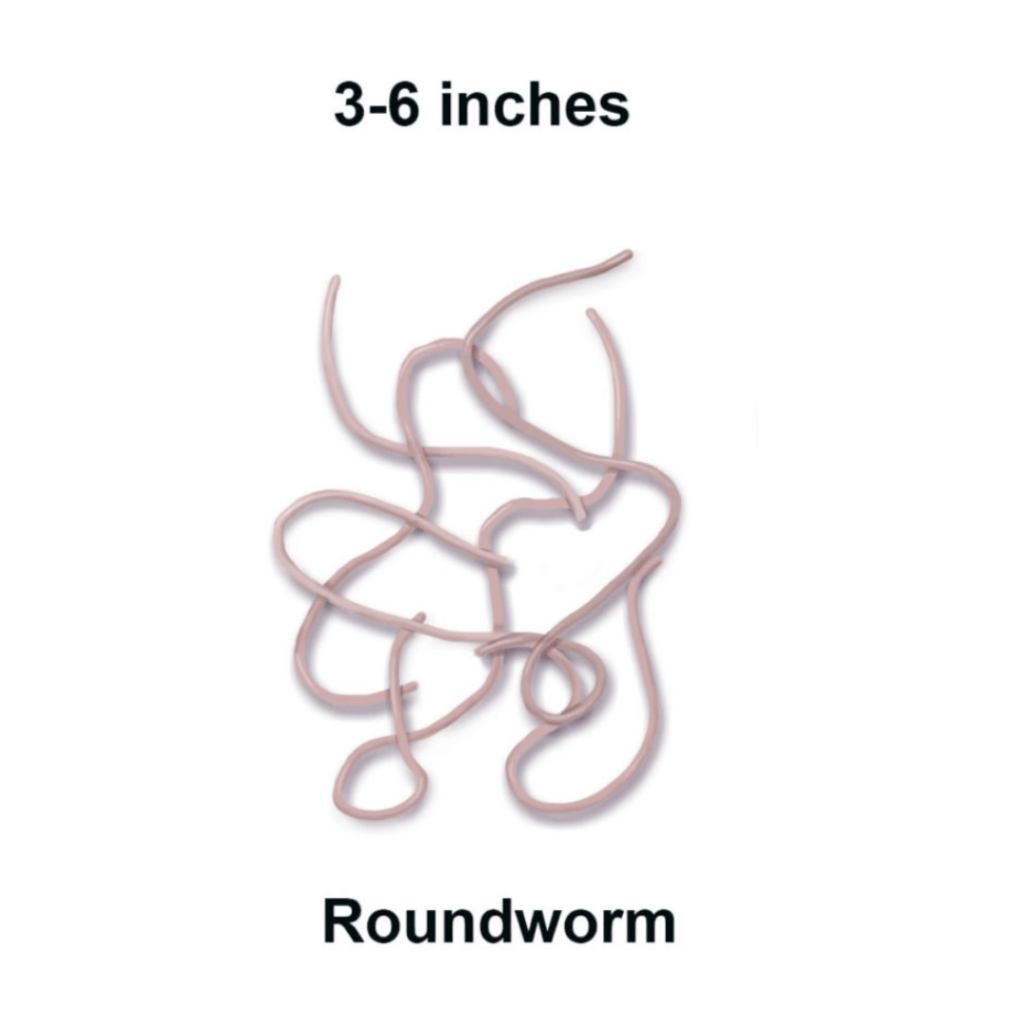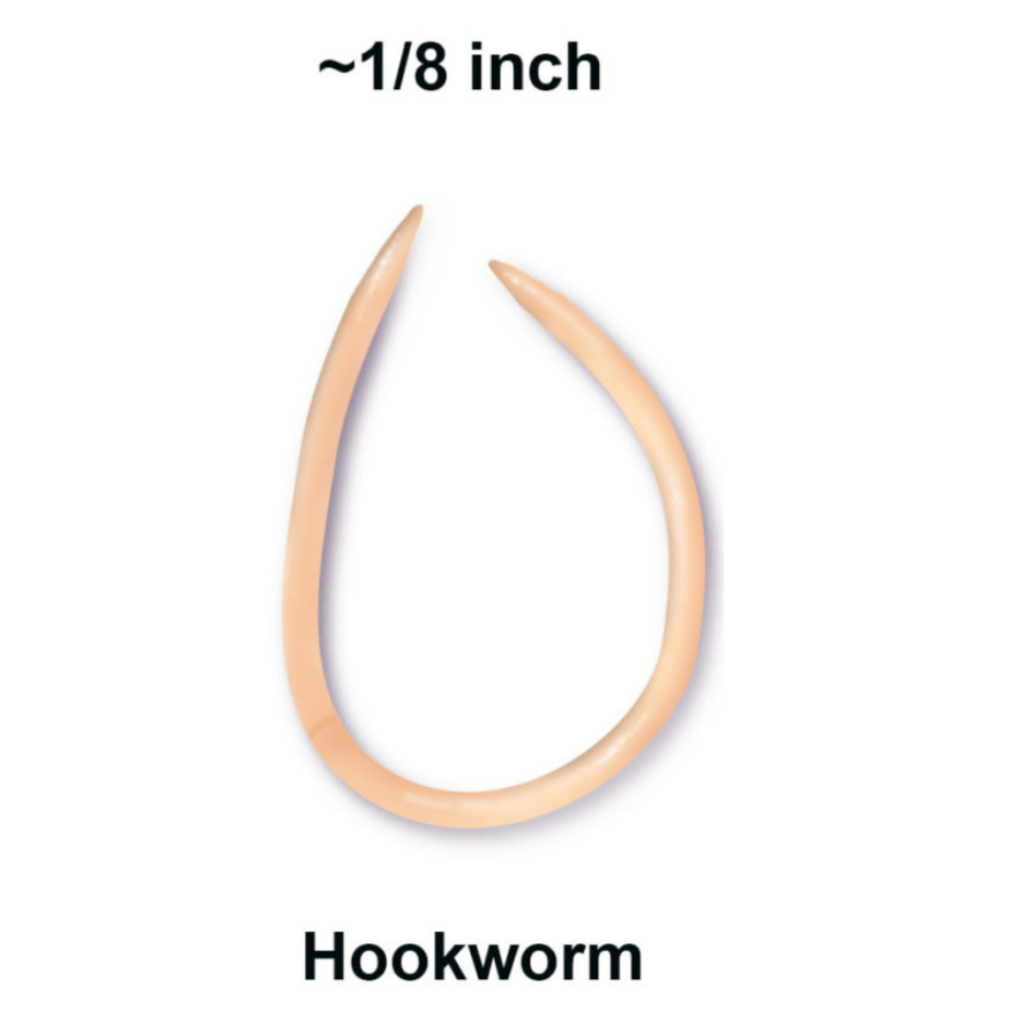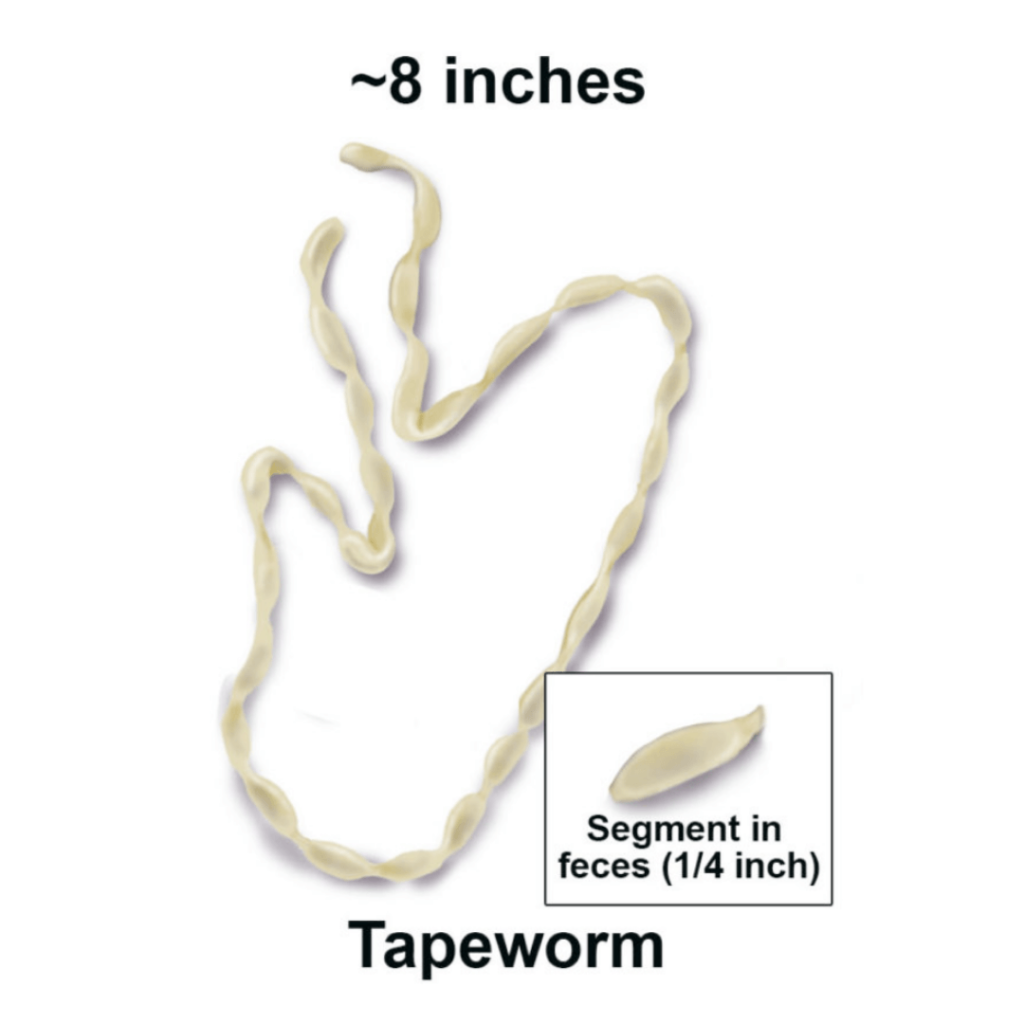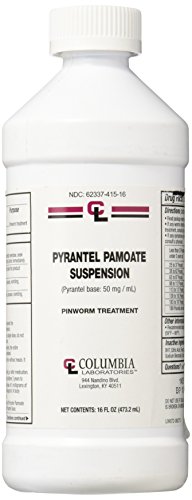How does an indoor cat get worms is a question every pet parent needs to think about.
Worms can be very troublesome and you must think about ways of preventing and eliminating them.
To aid the treatment, you need to first identify the kind of worms your cat has. This way, you can find the best over the counter cat dewormer for kittens and cats.
In this guide, we will tell you exactly how indoor cats can develop different types of worms and internal parasites. This information can help you take necessary steps to prevent them as well.
How does an Indoor Cat Get Worms?
A) Roundworms

What is it
Roundworms are the most common types of worms in kittens and cats. It is estimated that nearly 75% of cats will have roundworms.
Roundworms are 3-6 inch long worms living in your cat’s intestines and survive on the food eaten by your pet.
How can an indoor cat Get roundworms
Adult outdoor cats get roundworms through ingesting roundworm larvae and eggs present in their prey.
Indoor kittens can get roundworms from the breast milk of the infected mother cat or when they lick your shoes or clothing that have unknowingly picked up their larvae and eggs from feces outside.
Indoor cats also end up getting roundworms when they trap and eat a mouse that has entered your home.
Symptoms of roundworms
Some cats have no symptoms at all.
Others could develop appetite changes, constipation, diarrhea, or nausea and vomiting.
In advanced cases, you might see spaghetti-like worms in the cat’s throw-ups.
B) Hookworms
What is it

Hookworms are less common than roundworms but still seen in many cats. They are small and thin and attach to the host cat’s intestinal lining to subsist on its blood.
How does an indoor cat get hookworms
Hookworms are passed out of an infected cat’s feces.
If you have a cat that goes out, it could accidentally step on cat feces and get worms that could infect your other (indoor) cats through the litter box.
Mother cats could also pass hookworms to their kittens through milk.
Pests like houseflies and rodents can bring in eggs and larvae of hookworms indoors. When your cat grooms its paws, it might accidentally ingest these larvae and eggs.
Symptoms of hookworms
Cats with hookworms have black or bloody diarrhea with tar-like consistence.
Because of blood-loss, many cats develop anemia.
In early stages they could experience labored breathing or wheezing because hookworms can enter the lungs as well.
If not treated in time, hookworms can end up killing your cat.
C) Tapeworms

What is it
Tapeworms are easy to identify because of their segmented bodies.
The segments have the capacity to bear and lay eggs. These get passed off through the stools where the newly hatched larvae then seek another host.
Tapeworms anchor themselves to the host’s intestines where they absorb all the nutrients from the ingested food.
How does an indoor cat get tapeworms
Indoor cats typically get tapeworms from infected fleas.
A flea might lick the feces containing the tapeworm larvae. If your cat or kitten happens to swallow or lick the flea while grooming or gets bitten by the flea, then the tapeworm eggs could get released inside your pet’s body.
That is why, you must prevent fleas in your pet by using regular flea tick and worm treatment for cats.
Symptoms of tapeworms
Many kittens do not show any symptoms at all – they might just have low body weight and general un-thriftiness.
You might even see tapeworm segments in the cat litter. They look like pieces or rice which may move around in the litter box.
You might also find tapeworm segments on the back of your pet’s legs on its fur or sticking out from under the cat’s tail.
D) Heartworms
What is it
Heartworms are usually rare in cats, and are more common in dogs.
However, it is a serious condition which you mustn’t ignore.
Heartworms are spaghetti-like in appearance.
How does an indoor cat get heartworms
Like in dogs, cats and kittens can get heartworms when bitten by mosquitoes carrying the infective stage of heartworm larvae. These larvae get injected into the cat through the mosquito’s bite.
The good news is that cats are not that great hosts for heartworms as dogs are. That is why, only a small percentage of heartworms actually reach adulthood in a cat’s body.
Symptoms of heartworms
Heartworms cause lung disease as primary symptom in the host cat.
Your cat might wheeze, have trouble breathing, or develop a chronic cough when heartworms are present.
Symptoms of Worms in Cats
The symptoms of worms in cats will vary based on the type of worms infesting your pet.
In general, these parasites cause the following symptoms in cats:
1. Weight loss
Cats with hookworms, tapeworms, and roundworms can experience severe weight loss resulting from diarrhea, vomiting, and lack of appetite.
Tapeworms and roundworms ingest all the food that your cat eats, which is also the cause behind the weight loss.
2. Labored breathing and wheezing
The inability to breathe normally usually indicates the presence of hookworm in cats’ lungs. Hookworms in lungs also cause labored breathing.
3. Severe anemia
Some younger cats and kittens also develop severe anemia due to poor appetite and bloody diarrhea. In extreme cases, this could result in death.
4. Stool changes
Some kittens with roundworms have no other symptoms than stool changes. These could be constipation, diarrhea, and bloody or tar-like stools which indicates blood in stools.
5. Vomiting and nausea
In advanced cases of roundworms, cats can show nausea, extreme vomiting, the presence of ‘spaghetti-like’ worms in the vomit, as well as total lack of appetite. (Check out our guide on the Best Cat Food for Vomiting).
Let us now find out how to identify worms in cats and kittens.
Also Read: Best Flushable Cat Litter
How to Deworm Your Cat Naturally
Conventional treatment for deworming cats includes medicines like pyrantel pamoate, febendazole, metronidazole, and praziquantel.
However, many of these are quite toxic, especially to young kittens. They can cause adverse reactions like vomiting and diarrhea in your pet.
As a result, many holistic vets recommend natural deworming remedies for cats.
It is best to consult your vet or a holistic practitioner before using these natural de-worming remedies:
1. Garlic
Dr. Shawn Messonnier, D.V.M. recommends garlic as the principal natural deworming treatment for cats in his book Natural Health Bible for Dogs & Cats.
Dr. Messonnier believes that garlic has the potential for killing many bacteria, viruses, fungi, as well as intestinal parasites. It is especially useful as a tapeworm treatment in cats.
He recommends a dosage of 1 clove of garlic per 10-30 lb. of body weight per day.
Do not use garlic if your cat has anemia or has just had surgery.
Discontinue use if your pet shows signs of intestinal gas or allergic reaction.
2. Herbal remedies
Wormwood, pumpkin seeds, Quassia wood, and Southernwood are some other herbal remedies for naturally deworming cats.
Please consult a holistic vet for the right dosage.
3. Homeopathic remedies
Abrotanum, Cina, and Santonine are some great homeopathic options for cat’s natural deworming.
Please consult a homeopath for the exact remedy and dosage based on your pet’s overall health profile.
Best Over The Counter (OTC) Cat Dewormer
The best over the counter cat dewormer depends on the types of worms your cat has.
1. Roundworms
Since roundworms are highly prevalent and most common infestation in cats, all kittens aged 2 weeks and above should be treated for it.
Pyrantel pamoate and Piperazine Citrate are the most common OTC dewormers for roundworms. Please select the right dosage based on your cat’s weight.
We recommend the No products found..
No products found.It is safe and effective OTC medicine to eliminate roundworms in cats 6 weeks and older.
The active ingredient in this medicine is Piperazine Citrate which safely and efficiently kills worms without any adverse side-effects.
Cats that were scrawny and having poor countenance regained their weight and playful behavior once they were treated with No products found..
Excel is tasty and easy to feed. You can easily get cats to lick it up (or you can feed the liquid with a dropper) and there is no need for mixing it with anything.
Within a few hours, all the worms will be out!
Cats treated with Excel quickly regained all their lost appetite and weight and started playing cheerfully again!
Where prescription dewormers can cost hundreds of dollars, Excel is a proven cost-effective, and affordable over-the-counter treatment for deworming young kittens.
No products found.
2. Hookworms
There are many OTC and prescription medicines for eliminating Hookworms.
Mostly, these drugs are the same as those used for treating roundworms.
OTC medicines with Pyrantel pamoate is an option for treating cats having hookworms.
We recommend Pyrantel Pamoate Suspension – it is safe for eliminating hookworms, pinworms, and roundworms in cats 2 weeks and older.

Cats 2 weeks and older can be administered this drug based on their weight.
It is easy to use with a flavor that most cats love.
- Treats infections caused by pinworms
- Item Package Length: 6.604cm
- Item Package Width: 6.858cm
- Item Package Height: 17.526cm
3. Tapeworms
There are many medicines available over-the-counter for treating kittens and cats with tapeworms. The most common drug is praziquantel. Please speak to your vet about the right dosage for your pet.
If you don’t know what type of worms your cat has, you can get a broad spectrum cat dewormer.
We recommend the Bayer Tapeworm Dewormer for cats 6 weeks and older.

Bayer Tapeworm dewormeris a must-have when you are dealing with a flea infestation in your cats because fleas could lead to tapeworms in cats.
It is convenient to administer, and safe for cats 6 weeks and older. You can easily crumble up the tablet in your pet’s food or mix it with some broth.
Bayer makes it easy to get rid of tapeworms without any hassles. A single dose does the trick, so you don’t have to bother remembering when to give the next dose.
Hundreds of thousands of users have loved the fact that this deworming pill had no strong smell so it could be easily mixed with cat food without the kitties getting suspicious.
Also, majority of the cats treated did not display any adverse effects or behavioral changes.
Bayer Tapeworm destroyer has literally saved the lives of hundreds of thousands of cats!
It is also an ideal alternative to cat parents that find vet visits tedious or prescription medicines too expensive.
- 3-count bottle of tapeworm dewormer for cats
- Easy effective way to remove common tapeworms in cats
- Tablets may be crumbled and mixed with food or taken by mouth
- Tapeworm Dewormer for Cats will remove the common tapeworms, Dipylidium caninum and Taenia taeniaeformis, from cats and kittens
- For use in cats over 6 weeks of age
Also refer to our article on Best Over-the-Counter Dewormer for Cats where we have discussed many OTC deworming medicine options for different kinds of worms in cats.
Best Worm Medicine for Kittens
Now that you know ‘how does an indoor cat get worms‘, let us find out how to treat this issue.
Most deworming medicines for cats available today are generally safe for young kittens.
Note that, vets recommend deworming kittens only once they reach 2-4 weeks of age. This is because of the possible side effects of these medicines, mainly vomiting and diarrhea, which weak kittens might not be able to handle.
Speak to your vet about the right medicine and dosage based on your pet’s age, weight, and overall health profile.
Here is our pick of the best worm medicine for kittens available over-the-counter:
Best Over The Counter Broad Spectrum Cat Dewormer for Kittens
Drontal Broad Spectrum Dewormer, 50 Tablets

Cats and kittens over the age of one month (4 weeks) and weighing over 1.5 lb. can benefit from this broad spectrum dewormer. It safely and effectively eliminates roundworms, hookworms, and tapeworms.
Many times, pet parents are unsure of the worms their cat has.
Drontal Broad Spectrum Cat Dewormer is an ideal solution for such people because it takes care of many different types of worms.
This product is easy to administer, very reliable and cost-effective for multi-cat homes.
- Broad spectrum dewormer for tapeworms, roundworms and hookworms
- For cats and kittens over 1 month of age and 1.5 pounds
- Give one tablet per 4-8 lbs. body weight
- May be given directly by mouth or in a small amount of food
Can Worms Kills Cats?
Yes, worms, if not treated right away, can cause serious health issues including death in cats.
Young kittens can especially get very sick due to worms.
Depending on the type of worms your cat has, it could develop some very serious symptoms. These include bloody diarrhea, severe vomiting, reduced appetite, painful wheezing, and breathing troubles.
In some cases, cats are even known to lose a lot of blood, resulting in anemia.
Overtime, your vet might advise you to put your cat to sleep to relieve it of its pain.
All this can be avoided with proper treatment and through following a regular deworming schedule.
You also know now how does an indoor cat get worms, so you can take the steps to eliminate them.
Can Humans Get Worms from Cats?
Young children could get worms from cats.
For example, tapeworm eggs in cat’s feces can remain active for several weeks.
If a child puts its hands where your cat has defecated, and then puts the same hands in its mouth, it could develop tapeworms.
The same is true with roundworm eggs. Children could pick up eggs of roundworms found on cats’ bodies and feces.
A cat that has swallowed a tapeworm-infected flea might lick a child on its mouth. Those tapeworm eggs or larvae can then get transmitted through the saliva into the child’s body.
That is why, it is very important to address the question ‘how does an indoor cat get worms’ and also take preventive steps to avoid this situation.
Conclusion
How does an indoor cat get worms is an important question every cat parent must address.
Worms can cause distressing symptoms in your pet and could also lead to its death. Worms can also get transmitted to young children from your pet.
We recommend the Drontal Broad Spectrum dewormer for cats and kittens over 1 month of age.
It is easy to administer and also a cost-effective way of deworming and keeping your cats safe from the harmful effects of several different types of worm infestations.
amzn_assoc_placement = “adunit0”;
amzn_assoc_search_bar = “true”;
amzn_assoc_tracking_id = “thp20-20”;
amzn_assoc_search_bar_position = “bottom”;
amzn_assoc_ad_mode = “search”;
amzn_assoc_ad_type = “smart”;
amzn_assoc_marketplace = “amazon”;
amzn_assoc_region = “US”;
amzn_assoc_title = “Shop Related Products”;
amzn_assoc_default_search_phrase = “best cat dewormer”;
amzn_assoc_default_category = “PetSupplies”;
amzn_assoc_linkid = “2ea434e550820a0746d0e1441e2ac699”;
amzn_assoc_default_browse_node = “2619533011”;


